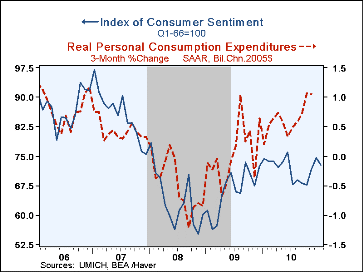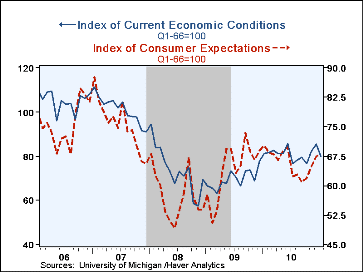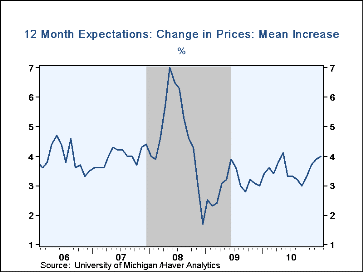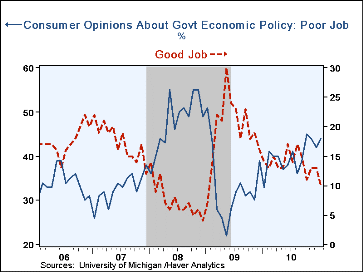 Global| Jan 14 2011
Global| Jan 14 2011Consumer Sentiment Sours A Bit
by:Tom Moeller
|in:Economy in Brief
Summary
Holiday glee toned down in the new year. The mid-January reading on consumer sentiment from the University of Michigan slipped to 72.7 following gains during the prior two months. Nevertheless, the figure remained near its highest [...]
Holiday glee toned down in the new year. The mid-January reading on consumer sentiment from the University of Michigan slipped to 72.7 following gains during the prior two months. Nevertheless, the figure remained near its highest since June. The January reading was weaker than Consensus expectations for a rise to 75.5. During the last ten years there has been a 60% correlation between the level of sentiment and the three-month growth in real consumer spending.
The weakness in consumer sentiment centered in the reading of current economic conditions. The January figure fell 6.4% to its lowest since October. The reading of current personal finances fell 3.7% to its lowest since September. The reading of buying conditions for large household goods, like appliances and furniture, fell harder 7.9%, but only to its lowest since October. The expectations component of consumer sentiment remained firm and rose 1.0% to its highest since June. Holiday spending was done against the backdrop of lower expectations of personal finances over the next year. However, the reading of business conditions during the next twelve months surged 10.1% to its highest since September 2009. Expectations for conditions during the next five years held constant for the second month.
Expected price inflation during the next year increased further to 4.0%, the highest level since May. Going the other way, respondents' view of government policy, which may eventually influence economic expectations, deteriorated to a reading of 66, its lowest in two years. A lessened ten percent of respondents thought that a good job was being done by government while 44% thought a poor job was being done, nearly the most since January 2009.
The Reuters/University of Michigan survey data are not seasonally adjusted. The readings are based on telephone interviews with just over 300 households during early-to-mid November. The summary indexes are in Haver's USECON database with details in the proprietary UMSCA database.
Consumers and the Economy, Part I: Household Credit and Personal Saving from the Federal Reserve Bank of San Francisco is available here.
| University of Michigan (Q1'66 = 100) | Mid Jan |
Dec | Nov | Jan Y/Y |
2010 | 2009 | 2008 |
|---|---|---|---|---|---|---|---|
| Consumer Sentiment | 72.7 | 74.5 | 71.6 | -2.3% | 71.8 | 66.3 | 63.8 |
| Current Economic Conditions | 79.8 | 85.3 | 82.1 | -1.6 | 81.0 | 69.6 | 73.7 |
| Personal Finances | 77 | 80 | 81 | 0.0 | 79 | 67 | 78 |
| Buying Conditions For Large Household Goods | 129 | 140 | 131 | -3.0 | 130 | 112 | 112 |
| Expectations | 68.2 | 67.5 | 64.8 | -2.7 | 65.9 | 64.1 | 57.3 |
| Expected Change In Personal Finances | 107 | 112 | 109 | -3.4 | 110 | 113 | 107 |
| Business Conditions Next 12 Months | 87 | 79 | 71 | 3.6 | 75 | 65 | 48 |
| Business Conditions Next 5 Years | 78 | 78 | 78 | -9.3 | 79 | 78 | 73 |
Tom Moeller
AuthorMore in Author Profile »Prior to joining Haver Analytics in 2000, Mr. Moeller worked as the Economist at Chancellor Capital Management from 1985 to 1999. There, he developed comprehensive economic forecasts and interpreted economic data for equity and fixed income portfolio managers. Also at Chancellor, Mr. Moeller worked as an equity analyst and was responsible for researching and rating companies in the economically sensitive automobile and housing industries for investment in Chancellor’s equity portfolio. Prior to joining Chancellor, Mr. Moeller was an Economist at Citibank from 1979 to 1984. He also analyzed pricing behavior in the metals industry for the Council on Wage and Price Stability in Washington, D.C. In 1999, Mr. Moeller received the award for most accurate forecast from the Forecasters' Club of New York. From 1990 to 1992 he was President of the New York Association for Business Economists. Mr. Moeller earned an M.B.A. in Finance from Fordham University, where he graduated in 1987. He holds a Bachelor of Arts in Economics from George Washington University.
More Economy in Brief
 Global| Feb 05 2026
Global| Feb 05 2026Charts of the Week: Balanced Policy, Resilient Data and AI Narratives
by:Andrew Cates










